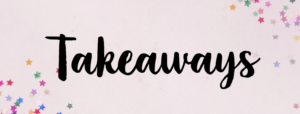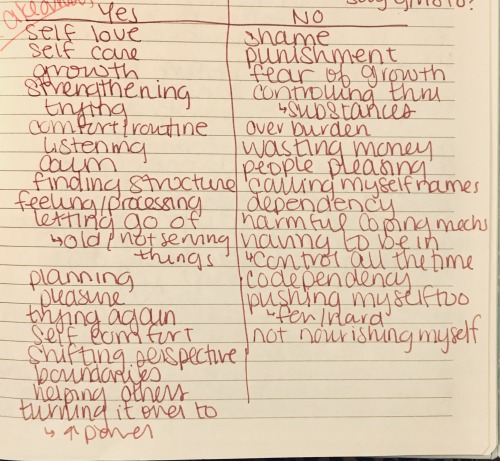Before I realized that my willingness to overcommit myself was clogging my system and draining my emotional/mental/physical resources, I took a lot of pride in the bursting capacity of my to do list.
With that pride came lots of negative self talk, crankiness, and a big fear of saying No.
You can only imagine how mind-blown I was to hear the concept when you say Yes to something, you are saying No to something else. Brooke McAlary and Kelly Exeter presented it in their podcast “Let It Be” to explain how they realized that choosing Yes to a speaking engagement meant choosing No to spending time with their families. I’ve been using and refining my own version of the mantra since then.
This week’s post will show you how to check in with yourself and identify your own Yes’s and No’s, make conscious choices to put your energy into change that fits your long-term goals, and make in-the-moment decision making feel more graceful and intentional.
Why Choose Yes or No?
We all have limited amounts of time, energy, focus, and willpower. It’s up to you to divvy your finite personal stores of those resources between things like work, hobbies, self development, loved ones, alone time, doctor’s appointments, running errands, and the rest of your unending “etc.” list.
Every time you say Yes to something, you spend some of your time, energy, focus, and willpower from your resources budget, which means you have less left to give to other things.
If you constantly say Yes to taking on more and more responsibilities, you will run your resources budget dry, and you may find yourself resenting others or berating yourself for not being “good/smart/talented/well/efficient/etc. enough.” Neither of these feels good, and you deserve to have more agency in the matter of how you spend your personal resources.
So what do you do? You identify how saying Yes or No to something will affect your life BEFORE you make a decision. If saying Yes to a job opportunity means that you have to say No to spending time, energy, focus, or willpower on self care, seeing your loved ones, healing, or doing other things you love, then be absolutely sure that your Yes is warranted.
A Note on Nuance
I recognize that choosing a clean Yes or No is not always 100% black and white, or even possible. In fact, I think it is important to recognize that our Yes’s and our No’s will naturally ebb and flow. This tool should serve to motivate self development—not set us up for unrealistic standards or perfectionism.
A Key Example on When Choosing Yes & No is Nuanced: Depression
I’ve mentioned before in The Tending Year that I struggled with clinical depression in the past. When I was in the depths of depression, it took all of my resources budget to do tasks that many people take for granted, like showering, cooking, eating, or doing my laundry.
Even though I knew that saying Yes to getting up and showering was saying Yes to caring for myself, I sometimes only showered once a week, and only because my best friend sat in the bathroom and chatted with me while I did. Sometimes I said No to washing my hair, because it was exhausting to hold my arms up for that long. Regardless, my shower was a success. Similarly, I knew that saying No to eating junk food was probably a healthier decision in the long run, but I also knew that depression stole my appetite, so saying Yes to nutty bars and McDonalds french fries meant that I was able to practice feeding myself. Another genuine success at taking care of my basic needs!
Now that I am no longer suffering from depression, I am much more likely to say Yes to maintaining a daily routine of doing my dishes, scooping the kitty litter, putting away stray clothes, and taking my supplements. Although having these things done contributes to my general happiness, I sometimes don’t have those resources due to high pain or stress levels. When I choose to say Yes to pushing myself past my comfort zone when I’m in pain or too exhausted, I sometimes cause more pain and negative self talk about my ability to do X or Y, so it is important that I allow myself to approach my Yes and No to daily cleaning with some flexibility. Saying Yes to cleaning daily means saying yes to better mental health for me, but that doesn’t mean that sometimes saying No makes me a bad person.
A Yes one day may be a No tomorrow, and that doesn’t mean that you are any less worthy.
I suggest that those who can resonate with the experiences I described in this section check out artist Hannah Daisy’s #boringselfcare artwork. I love the way that she validates and celebrates the challenging experience of performing “small” or “boring” self care practices for people who may be living with chronic pain or mental illness.

The following three takeaway prompts will help you to get to know yourself better now so you can more easily choose future Yes’s and No’s that align with your intentions and goals.
Write Your Own Yes and No List
When you connect your in-the-moment decisions to your larger goals, you will have more confidence to make choices that line up with you intentions.
Write a list of things that you want to say Yes to, meaning dedicate your time, energy, focus, and willpower to manifesting more of.
Next, write a list of things that you want to say No to, meaning things you would like to dedicate less time, energy, focus, and willpower to.
Here’s an example of what my list looks like:

Once you’ve done that, practice making Choosing Yes and Choosing No statements with what you wrote above. The goal is to reinforce your choice to say Yes or No by relating or comparing it to another goal.
- When I say Yes to ___, I say No to ___.
- When I say Yes to ____, I say Yes to ____.
- When I say No to ___, I say Yes to ____.
- When I say No to ____, I say No to ____.
Here are two of my examples: When I say Yes to practicing self comfort, I say Yes to healing and no to unhealthy coping mechanisms like codependency. When I say No to overburdening myself with responsibilities, I say Yes to shifting my perspective about what productivity should look like.
Non-Negotiables
Do you have anything that you absolutely must say Yes to? What about things you absolutely must say no to? Why?
One of my non-negotiable No’s is negative self talk. I know it does not serve my path or my development, so I try to catch myself whenever I start to use it and I try to name it out loud to myself or others and intentionally make a more caring choice about how to treat myself.
A Yes is a boundary. A No is a boundary.
Abstain, Moderate, or Try Anything Once?
There are some things that can be both a Yes and a No for the same person, depending on context, amount, and frequency. Some people choose to moderate their behavior when it comes to certain things, like smoking a cigarette once a year at a party. Alternatively, some people choose to abstain completely from particular things. I am a abstainer when it comes to particular substances that I may become or have been addicted to (such as alcohol and cigarettes), although I moderate my addiction to black coffee by enjoying just one small cup every morning.
Are there behaviors that you feel better about moderating? Are there behaviors that you feel better about abstaining? Are there things on your bucket list that you would immediately say Yes to if you were given the opportunity?
Answer all three questions and then try to identify in one sentence each why you feel that way. Having a succinct framework or mantra can provide you with guidance for choosing Yes or No when it comes to abstaining, moderating, or signing up for that hot air balloon ride (which I will politely choose to abstain from).
*Please note that the original version of this blog post was published here.
Newsletter
Sign up below to access my free newsletter, Tending with Dr. Kate Henry.

